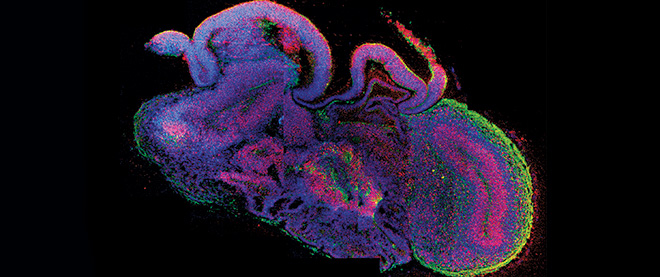Cultivating mini-brains
New development lets scientists “study human development in a dish”
Madeline A. Lancaster / IMBA
Share

The brain is the most complex natural structure that we know of. In Vienna, a team of scientists has successfully managed to grow “mini-brains” out of human stem cells. According to Jürgen Knoblich of the Institute of Molecular Biotechnology, who led the work, they will allow us to “study human development in a dish.” (The study was published in August in the journal Nature.)
The pea-sized brains, which measure about four millimetres across, were first grown in a synthetic gel, then placed in a spinning bioreactor that infused them with nutrients and oxygen. After about a month, defined brain regions—including a cerebral cortex—began to appear, and even seemed to interact with one another, although the regions weren’t necessarily in the right places. The brains are “quite small, because they don’t have blood vessels,” Knoblich explains. “Nutrients can diffuse inside, but they’re not actively transported. That’s the next step.” After two months, the brains reached their maximum size; they seem to survive indefinitely inside the bioreactor. Some have been there for a year.
Knoblich’s team recently used this technique to study microcephaly, a rare genetic abnormality that leads to an unusually small brain. They took skin cells from a microcephaly patient and, after converting these to stem cells, grew mini-brains to model the disease. These brains grew to an even smaller size because stem cells were transforming into neurons prematurely “at the expense of other stem cells,” he says. Knoblich’s team hopes to use mini-brains to model other diseases, like autism and schizophrenia; they could also be invaluable for testing new drugs.
To put anxious minds at ease, Knoblich notes that these little brains aren’t capable of thought. “Thinking is a complicated cognitive process that we’ll [likely] never be able to model in a dish,” Knoblich says. “And probably also shouldn’t, of course.”